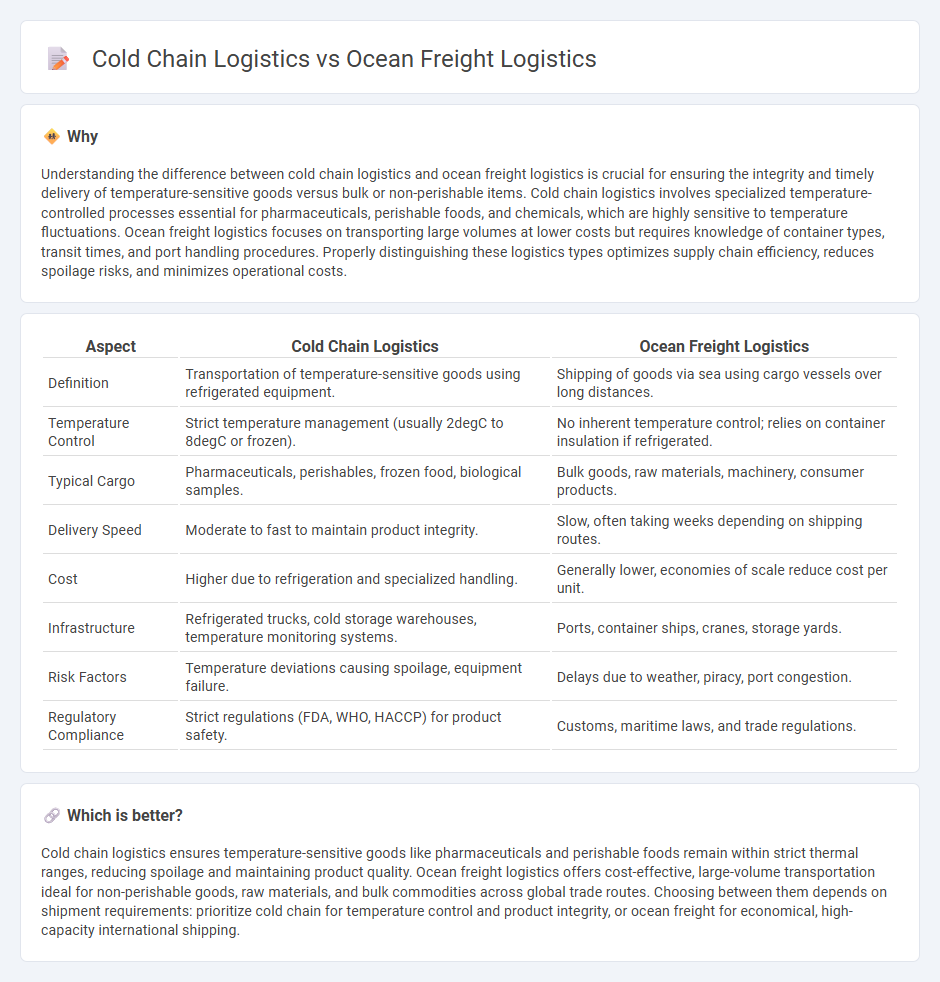
Cold chain logistics ensures temperature-sensitive goods like pharmaceuticals and perishable foods are maintained within strict thermal parameters throughout transportation, preventing spoilage and ensuring quality. Ocean freight logistics focuses on the efficient shipment of large volumes of goods across international waters, optimizing cost-effectiveness and transit times for various cargo types. Explore detailed comparisons and industry insights to understand how each logistics method suits specific business needs.
Why it is important
Understanding the difference between cold chain logistics and ocean freight logistics is crucial for ensuring the integrity and timely delivery of temperature-sensitive goods versus bulk or non-perishable items. Cold chain logistics involves specialized temperature-controlled processes essential for pharmaceuticals, perishable foods, and chemicals, which are highly sensitive to temperature fluctuations. Ocean freight logistics focuses on transporting large volumes at lower costs but requires knowledge of container types, transit times, and port handling procedures. Properly distinguishing these logistics types optimizes supply chain efficiency, reduces spoilage risks, and minimizes operational costs.
Comparison Table
| Aspect | Cold Chain Logistics | Ocean Freight Logistics |
|---|---|---|
| Definition | Transportation of temperature-sensitive goods using refrigerated equipment. | Shipping of goods via sea using cargo vessels over long distances. |
| Temperature Control | Strict temperature management (usually 2degC to 8degC or frozen). | No inherent temperature control; relies on container insulation if refrigerated. |
| Typical Cargo | Pharmaceuticals, perishables, frozen food, biological samples. | Bulk goods, raw materials, machinery, consumer products. |
| Delivery Speed | Moderate to fast to maintain product integrity. | Slow, often taking weeks depending on shipping routes. |
| Cost | Higher due to refrigeration and specialized handling. | Generally lower, economies of scale reduce cost per unit. |
| Infrastructure | Refrigerated trucks, cold storage warehouses, temperature monitoring systems. | Ports, container ships, cranes, storage yards. |
| Risk Factors | Temperature deviations causing spoilage, equipment failure. | Delays due to weather, piracy, port congestion. |
| Regulatory Compliance | Strict regulations (FDA, WHO, HACCP) for product safety. | Customs, maritime laws, and trade regulations. |
Which is better?
Cold chain logistics ensures temperature-sensitive goods like pharmaceuticals and perishable foods remain within strict thermal ranges, reducing spoilage and maintaining product quality. Ocean freight logistics offers cost-effective, large-volume transportation ideal for non-perishable goods, raw materials, and bulk commodities across global trade routes. Choosing between them depends on shipment requirements: prioritize cold chain for temperature control and product integrity, or ocean freight for economical, high-capacity international shipping.
Connection
Cold chain logistics relies heavily on ocean freight logistics to maintain temperature-sensitive goods during long-distance maritime transport. Specialized refrigerated containers and temperature-controlled monitoring systems are critical for preserving product integrity throughout ocean shipments. Efficient integration of cold chain protocols with ocean freight operations minimizes spoilage and ensures compliance with international safety standards.
Key Terms
**Ocean Freight Logistics:**
Ocean Freight Logistics involves the transportation of goods via sea, utilizing container ships and bulk carriers to move large volumes efficiently across international waters. This method emphasizes cost-effectiveness for heavy or bulky cargo, port handling, and transit time coordination, ensuring the seamless flow of imports and exports. Explore the key benefits and operational nuances of Ocean Freight Logistics to enhance your global supply chain strategy.
Bill of Lading
Ocean freight logistics utilizes the Bill of Lading as a critical document for consignor-consignee contract verification, title transfer, and cargo receipt confirmation, typically emphasizing containerized shipments and maritime transport regulations. In contrast, cold chain logistics incorporates specialized Bill of Lading elements to ensure temperature-sensitive goods maintain integrity throughout the supply chain, often integrating real-time temperature data and compliance with perishable goods standards like IATA or FDA guidelines. Explore detailed differences and best practices in Bill of Lading management tailored for these logistics sectors to optimize shipment security and regulatory adherence.
Containerization
Ocean freight logistics leverages large container vessels that facilitate the efficient transport of standard shipping containers across vast international routes, optimizing cost and transit times. Cold chain logistics integrates temperature-controlled containers within these ocean freight systems to maintain product integrity for perishable goods such as pharmaceuticals, seafood, and frozen foods throughout transit. Explore more about how containerization technology revolutionizes both ocean freight and cold chain logistics for global supply chains.
Source and External Links
Ocean Transport | Maersk - Ocean freight is the shipping of containerised cargo by sea, carrying over 90% of global trade with benefits including cost-effectiveness and lower emissions, and involves intermodal containers usable across ship, rail, and truck transport.
International Ocean Freight Shipping for Businesses | FedEx - FedEx offers comprehensive ocean freight forwarding services with end-to-end visibility, flexible options including last-mile day-definite delivery, direct distribution, and customs brokerage to optimize global shipping logistics.
Ocean Freight Forwarding Services & Logistics Solutions | Yusen Logistics - Yusen Logistics provides expert ocean freight forwarding with tailored solutions such as Full Container Load (FCL), Less than Container Load (LCL), multimodal transport, and customs brokerage leveraging a global network and carrier relationships.
 dowidth.com
dowidth.com